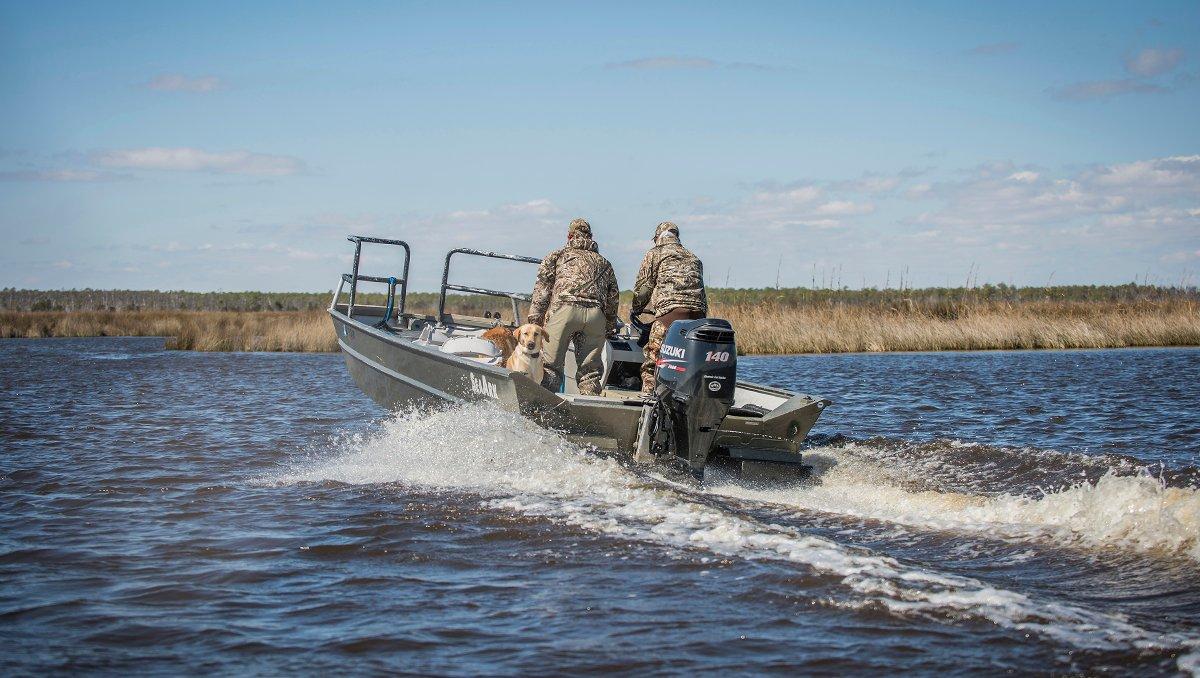Avoid these gaffes to stay safe this season
Many days, waterfowl hunters are boaters. We use all types of crafts — skiffs, canoes, jon boats, deep-Vs and more — to access hotspots. Shoot, some days, we hunt from those rigs and stay in them all day.
But now and then, we seemingly forget many cardinal rules of boating. And when you're dealing with icy water, fearsome weather, treacherous travel and loads of gear, that can be dangerous or even fatal. Let's examine several common waterfowling boating fails and how to avoid them.
Don't Check or Maintain Equipment
Some folks don't run their duck or goose boats year-round. In fact, many dig them out of mothballs the night before opening day and assume they'll perform flawlessly. Big mistake. Having spent much of an October day stranded on a large lake because of a dead battery, I can attest that you must always check and maintain your boat, motor, trailer and accessories.
Make sure your batteries are charged. Run your motor to ensure it's in solid operating condition. Get your boat in the water to check for leaks or other performance issues. Double-check wiring, fuel-line connections and other basic performance considerations. Many gear issues involve quick fixes, but it's best to discover them during a warm summer afternoon instead of a frigid December morning.
Don't Learn the Water
Duck hunters love trying new spots and getting away from crowds. However, that often involves navigating unfamiliar — even dangerous — water. Smart waterfowlers learn as much as possible about their target water before launching.
Study navigation maps. Talk with other hunters about possible issues, such as narrow channels, stump fields, locks and dams, or even tidal cycles. Have an idea about what you'll encounter, and then proceed with caution before hitting the throttle. One hidden rock pile can end your day — trust me.
Don't Learn Your Craft
Likewise, some folks don't take enough time to practice with their boat. True, most crafts used for waterfowling are fairly similar, and experienced hunters probably have a solid idea about how to run them. Still, it's far easier to learn about nuances before hunting.
Get a feel for how your boat turns while under power. Find the fine line between the perfect amount of throttle versus too much gas. Know what to expect when waves kick up. Knowing your boat will let you perform like a pro when the game gets real.
Overloading
This might be the biggest waterfowl boating sin. Many days, we simply overload our crafts with dogs, decoys, blind bags, gun cases and wader-clad rednecks. That's bad news any time of year but especially treacherous when the cold winds of November, December and January blow.
Simple fix: Know your boat's weight capacity, and never exceed it. Further, learn how much gear and how many folks you can safely transport, and stick with that number. Making two trips might be a pain, but it beats clinging to an overturned craft while fighting hypothermia.
Wrong Boat for the Job
This goes hand in hand with No. 4. Sometimes, folks get overeager and use a boat that's not right for the job. I've seen guys pile three hunters in an unstable 14-foot aluminum V-hull and head into rough seas. Shoot, I almost died 30 years ago when a buddy and I hunted in a flat-bottom jon during a ridiculously windy day. Conversely, some guys try to use their 21-foot big-water rigs in rice marshes or timber holes. They're the ones who keep pulling their outboard up every 10 seconds to free the prop from weeds.
Bottom line: Use a boat and motor designed for the type of hunting you pursue. Obviously, this might require you to own several types of crafts. Of course, most waterfowlers don't shy away from gear.
Don't Keep Safety No. 1
Here's the simplest rule when using a boat for waterfowl: Always keep safety as your top priority. If that means calling off a trip because of rough seas, so be it. If it means picking up early so you can safely navigate tricky channels during daylight, great. And wear your dang life vest when the boat is under power.
Be safe, first and foremost, and err on the side of caution. You can worry about ducks and geese later.
Click here for more Realtree waterfowl hunting content. And check us out on Facebook.







